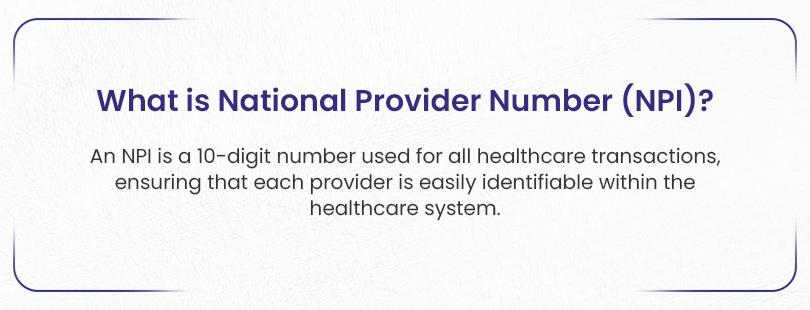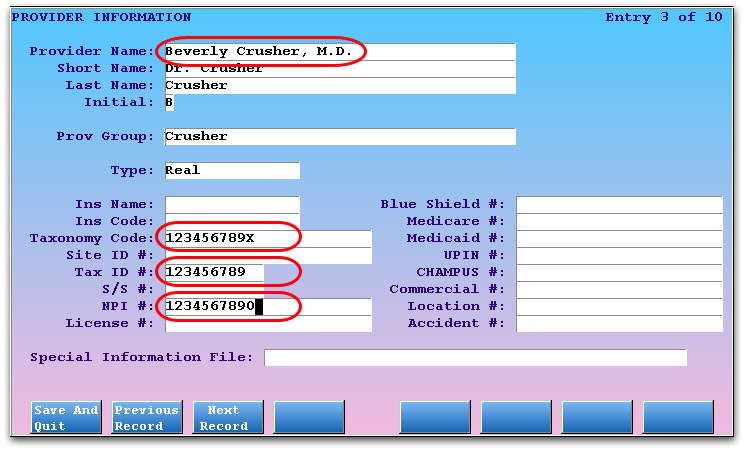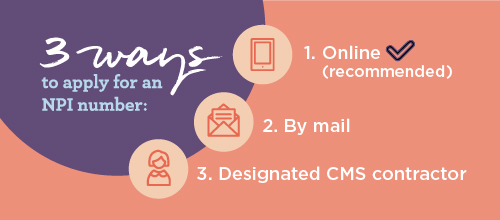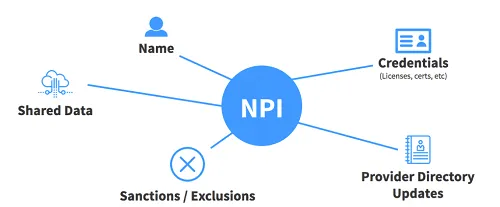In the United States, healthcare providers must obtain a National Provider Identifier (NPI) to conduct specific transactions under HIPAA regulations. An NPI is essential for billing, claims processing, and various administrative functions in the healthcare sector. This guide provides a comprehensive walkthrough to apply for an NPI, including key requirements, the application process, and additional tips for healthcare providers.

Overview of an NPI
The National Provider Identifier (NPI) is a unique, 10-digit identification number assigned to healthcare providers and entities by the Centers for Medicare & Medicaid Services (CMS). It’s used to standardize provider identification across different healthcare systems.
What is an NPI?
An NPI serves as a unique identifier for healthcare providers, required by HIPAA for covered transactions such as billing, claims, and referrals. It simplifies provider identification and improves the efficiency of healthcare transactions.
Types of NPI
There are two primary types of NPIs:
- Type 1 NPI: For individual healthcare providers (e.g., physicians, dentists).
- Type 2 NPI: For organizational healthcare providers (e.g., hospitals, group practices).
Who Needs to Apply for an NPI?
Healthcare providers, including physicians, dentists, nurses, and other practitioners who transmit any health data electronically, require an NPI. HIPAA-covered entities, such as hospitals and clinics, are also mandated to have an NPI.
Benefits of Having an NPI
An NPI number streamlines the billing process, ensures compliance with federal regulations, and standardizes provider identification across platforms. It also facilitates efficient data tracking and reporting.
How is NPI Used?
NPIs are used in a variety of healthcare transactions, such as:
- Billing and claims processing
- Coordination of benefits
- Insurance eligibility checks
- Payment and remittance advice

When Should a Provider Apply for an NPI
Healthcare providers should apply for an NPI in the following situations:
- Starting a New Practice: Newly licensed providers entering a practice must obtain an NPI to bill and claim services.
- Working as an Intern, Resident, or Medical Student: Those prescribing medications, ordering tests, or making referrals are required to have an NPI.
- Billing Medicare and Medicaid: If a provider intends to bill Medicare or Medicaid, they must possess an NPI.
- Changing Employment or Setting Up a New Entity: Providers transitioning to a different practice or setting up a group practice should apply for or update their NPI.
- Enrolling in Insurance Networks: Many insurers require NPI numbers for credentialing and provider enrollment processes.
Documents Required to Apply for an NPI
The application for an NPI requires certain documents to verify the identity and qualification of the applicant.
1. Identifying Information
Providers need to supply their full name, social security number (SSN) or Individual Taxpayer Identification Number (ITIN), and date of birth. This information establishes the applicant’s identity and allows verification.
2. Business Information
If the provider is associated with a healthcare organization, the business name and Employer Identification Number (EIN) must be provided. This information links the NPI to the provider’s practice or organization.
3. Practice Location Address
The physical address of the practice location is necessary to complete the application. Providers also need to include a mailing address if it differs from the practice location.
4. Provider Taxonomy Code
Providers must include a taxonomy code that classifies their specialty or field of practice. This is a 10-digit alphanumeric code that denotes the provider’s specialization.
5. Contact Information
The application requires contact details, including an email address and phone number. This contact information allows CMS to communicate with the provider regarding application status and future updates.
6. Proof of Identification (If No SSN is Available)
Non-U.S. citizens without an SSN may provide alternative identification, such as a passport, driver’s license, or birth certificate, along with a letter explaining the need for an NPI. These documents must be translated into English if not originally in the language.
Who to Call or Mail to Order for an NPI

The application for an NPI can be submitted online or by mail. Here are the options and contact details:
- Online Application:
- The fastest way to apply is through the National Plan and Provider Enumeration System (NPPES) website. This portal allows providers to complete the application digitally, reducing processing time.
- Website: https://nppes.cms.hhs.gov/
- By Mail:
- Providers can download and complete the NPI Application/Update Form (CMS-10114) and mail it to the following address:
- NPI Enumerator 7125 Ambassador Road, Suite 100
Windsor Mill, MD 21244-2751
- NPI Enumerator 7125 Ambassador Road, Suite 100
- Providers can download and complete the NPI Application/Update Form (CMS-10114) and mail it to the following address:
- Customer Support for NPI Application:
- For assistance, providers can reach the NPI Enumerator by:
- Phone: 1-800-465-3203
- TTY: 1-800-692-2326
- Email: customerservice@npienumerator.com
- For assistance, providers can reach the NPI Enumerator by:
What Should I Do if My NPI is Rejected or Expired?
If an NPI application is rejected or expires, follow these steps:
- Review the Rejection Reason: Carefully examine the reason for the rejection, which may include incomplete information or incorrect documentation.
- Correct and Resubmit: Update the application form with the necessary corrections and resubmit. Double-check all information and required documents before resubmitting.
- Reapply if Necessary: In cases where significant changes are needed or the expiration is due to prolonged inactivity, a new application may be required.
- Contact NPI Enumerator: Reach out to the NPI Enumerator for guidance on reapplying or troubleshooting issues with expired NPIs. Customer service can assist in understanding the specifics of the rejection and ways to address it.
Top 10 Reasons for NPI Rejections and How to Solve Them
Applying for an NPI (National Provider Identifier) is a necessary step for healthcare providers in the United States. However, application rejections can occur due to various reasons. Knowing the common causes of NPI rejections and understanding how to address each can make the process smoother and quicker. Here are the top 10 reasons for NPI rejections and solutions for overcoming each one.
1. Incomplete Application Information
Rejection Reason
One of the most common reasons for NPI rejections is missing or incomplete information. This could be as simple as an incomplete address, missing SSN or ITIN, or incomplete practice location information.
Solution
- Double-Check Required Fields: Before submission, carefully review all sections of the application. Use an application checklist if possible.
- Confirm with a Peer or Supervisor: Having another set of eyes review the application can help catch any missed fields or information.
- Use the Online Application: The National Plan and Provider Enumeration System (NPPES) provides a step-by-step guide online to ensure all fields are completed before submission.
2. Invalid or Incorrect Provider Taxonomy Code
Rejection Reason
An invalid or incorrect provider taxonomy code will result in rejection. The taxonomy code is essential as it identifies the provider’s specialty.
Solution
- Use the Correct Taxonomy Code: Refer to the official taxonomy code list on the NPPES website. Ensure you choose a taxonomy code that accurately describes your specialty.
- Verify the Code: Double-check the taxonomy code to avoid typos or mismatches with your provider type.
3. Missing or Incorrect Social Security Number (SSN) or Individual Taxpayer Identification Number (ITIN)
Rejection Reason
If the SSN or ITIN is missing or entered incorrectly, the NPI application will likely be rejected.
Solution
- Enter Accurate Information: Carefully input the SSN or ITIN without any errors.
- Double-Check Documentation: Ensure that any supporting documents for the SSN or ITIN are accurate and up-to-date, especially if you are applying via mail.
4. Missing Legal Business Name or Employer Identification Number (EIN)
Rejection Reason
For organizational NPIs (Type 2), missing the legal business name or EIN results in application rejection, as this information is necessary for proper provider identification.
Solution
- Verify Business Details: Confirm the legal business name and EIN as registered with the IRS.
- Ensure Consistency: Make sure the business name on the NPI application matches the one on official IRS documentation to prevent mismatches.
5. Incorrect Practice Location Address
Rejection Reason
An incorrect or incomplete practice location address can lead to rejection, as it’s a key detail for identifying the provider’s service location.
Solution
- Double-Check Address Information: Confirm that the practice address is complete and accurate, including the ZIP code and any suite numbers.
- Use Standardized Address Format: Refer to USPS address standards to ensure the format matches U.S. mailing standards.
6. Incorrect Entity Type Selection
Rejection Reason
Selecting the wrong entity type (Type 1 for individuals, Type 2 for organizations) will lead to rejection since it affects how the NPI is registered.
Solution
- Choose the Correct Entity Type: Individual providers should select Type 1, while organizations (e.g., group practices, hospitals) should select Type 2.
- Consult with Colleagues: If unsure, consult with a supervisor or peer to confirm the correct entity type.
7. Missing or Incorrect Contact Information
Rejection Reason
Incomplete or incorrect contact details can result in a rejection because CMS needs accurate contact information to communicate with applicants.
Solution
- Verify Contact Details: Review the contact information, including email and phone number, to ensure they are accurate and up-to-date.
- Provide Alternative Contact: Include a secondary contact if possible, such as an office administrator, to facilitate prompt communication.
8. Missing Provider’s Signature on Paper Application
Rejection Reason
For paper applications, a missing or incomplete signature results in an automatic rejection since CMS requires the provider’s official authorization.
Solution
- Sign and Date the Application: Ensure the signature and date fields are completed on all sections requiring provider approval.
- Review Before Mailing: For paper submissions, double-check the form to confirm all required signatures are included.
9. Non-U.S. Citizen Without Proper Documentation
Rejection Reason
Non-U.S. citizens without an SSN who fail to provide alternative identification (such as a passport and letter of explanation) may have their application rejected.
Solution
- Provide Two Forms of Alternative ID: Non-U.S. applicants should include two forms of ID, such as a passport or driver’s license, and a letter explaining the need for an NPI.
- Translate Documents: Ensure that any non-English documents are translated into English, as required by CMS.
10. Incomplete Supporting Documentation for Changes
Rejection Reason
If you’re updating your NPI information, incomplete documentation related to the changes (e.g., practice location, business name) may cause rejection.
Solution
- Submit All Supporting Documents: Provide any required documents related to the updates, such as lease agreements for new practice locations.
- Contact NPI Enumerator for Guidance: Reach out to the NPI Enumerator if you are uncertain about specific documentation requirements.
Can a Non-US Provider Apply for an NPI in the United States?
Typically, only U.S.-based providers who meet HIPAA requirements or work within the U.S. healthcare system need an NPI. However, non-U.S. providers who have U.S.-based affiliations, such as telemedicine providers working with U.S. hospitals, may apply under specific conditions:
- Residency Requirement: Non-U.S. citizens working in the United States may apply if they hold a valid SSN or ITIN.
- Affiliation with a U.S. Entity: Providers affiliated with U.S.-based healthcare organizations, insurance networks, or institutions that require billing within the U.S. healthcare system may apply.
- Document Requirements: Non-U.S. providers without an SSN must submit two forms of identification and an explanation letter stating their need for an NPI.
Miscellaneous Information Every Provider Must Know Before Applying for an NPI
Healthcare providers should be aware of the following information before applying for an NPI:
- Application Processing Time: The time required to receive after you apply for an NPI depends on the volume of applications and whether the submission was made online or by mail. Online applications are generally processed within 10 days, while mail applications may take up to 20 business days.
- Free Application: Applying for an NPI is free of charge. Providers should avoid third-party services that charge fees for NPI application assistance. However, you can certainly hire people who can collaborate with you in billing. For instance, register medical billing companies to take burden off your shoulders.
- NPI Updates: Providers are responsible for updating their NPI information, such as changes in practice location, name, or taxonomy code. Updated information ensures the NPI remains current and valid.
- Use of NPI in Multiple Settings: Once issued, an NPI can be used across multiple healthcare settings, including hospitals, private practices, and telehealth services. It remains with the provider throughout their career.
- Importance of NPI Compliance: Maintaining an active NPI is essential for HIPAA compliance, as it is used in all transactions covered by HIPAA, such as claims, referrals, and payments.
Conclusion
Obtaining an NPI is a vital step for healthcare providers in the U.S. healthcare system. It streamlines billing, ensures compliance with HIPAA regulations, and standardizes provider identification across healthcare entities. By understanding the application process, required documents, and eligibility requirements, providers can secure their NPI efficiently. With this guide, you’re equipped to navigate the NPI application process, ensuring a smooth and compliant start to your healthcare practice.
If you’re a busy provider who wants to spend most of his/her time treating patients. We can apply for an NPI on your behalf. We are a registered medical billing company based in Minnesota. Contact us today and let us handle your billing tasks!




